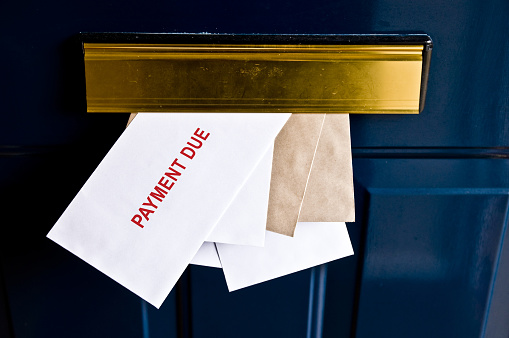From the mortgage and utilities to credit card payments, uncertain times can lead to financial trouble.
If you find yourself saying, “I can’t pay my bills,” you’re not alone. Thankfully, there are steps you can take to help mitigate the problem and keep a roof over your head until the storm passes.
Read on to discover a few ways you can manage your current bills and find out what types of resources are available to help you cope.
First Things First: Prioritize Your Bills
With the coronavirus currently front and center, it can be tough to make ends meet. Before you panic, it’s crucial to prioritize all of your bills and pay the most important ones first.
When it comes to the order of importance, housing is always king. Whether it’s rent or mortgage, this bill should always be paid first whenever possible. Food and utilities should come next since you’ll need power, water, and something to eat as you ride out these stressful times.
Bills that can be put on the back burner include things like student loan payments and even your credit card bills. Many banks and lenders will work with you as long as you contact them and inform them you’re having difficulty.
You can continue to pay your credit card monthly minimum due just to keep your account current, if possible. Call your credit card provider and ask about the possibility of lowering your interest rate or find out if any cards are offering a zero-percent balance transfer which can help you shave down debt faster.
Whenever you call any of your providers, make sure you have your account number and other important information handy to speed up the process. Remember that representatives should not ask for personal information like your social security number over the phone, but they may ask for the last four digits to confirm your identity.
I Can’t Pay My Bills: Rent and Mortgage
The COVID-19 pandemic has shuttered countless businesses, leaving renters and homeowners wondering how they’ll make their next payment. Thankfully, most states have suspended evictions, and some are even asking landlords to temporarily suspend rent.
If you own your home, most major lenders are currently suspending mortgage payments, too. In order to have yours suspended, you should contact them immediately and inform them of your situation. These suspensions are not happening automatically, so it’s your responsibility to reach out and come to an agreement.
Since the coronavirus pandemic is constantly changing the financial landscape, each state has its own set of rules for lenders and landlords. Check with your specific state to find out if there are any other options for rent and mortgage relief.
It’s very important to note that just because these payments may be suspended, it doesn’t mean you won’t be responsible for them later. Most mortgages will go into forbearance status, which basically means you’ll need to pay for every month that is suspended at a later date.
Find out how mortgage forbearance will affect your home loan as soon as possible. Some banks may simply extend the terms of your loan (i.e. add on every month you suspend payment to the length of the loan term), while others may allow you to repay it making monthly payments. A few lenders could ask for the amount due in total, so always get the terms of your specific situation in writing.
Another key item of note: any rent or mortgage suspension should not affect your credit at this time. Monitor your personal information and your credit carefully so you can be aware of any unexpected changes.
Utilities
From power and water to natural gas, the coronavirus pandemic is affecting people’s ability to pay even the most basic bills. Many utility companies are suspending cut-offs, so you won’t need to worry about the lights going out if you can’t currently pay your bill in full.
Check to find out if you’ll be hit with charges for any late payments on your utilities. Most companies are waiving those fees, but it can’t hurt to confirm. Just like your rent and mortgage, it’s best to reach out to your utility providers and find out how to qualify for a temporary payment suspension.
Even Internet providers are offering discounts and even free service to some customers. The Internet is one of the most crucial utilities, particularly at a time where many people are working from home, and school children are learning remotely.
What About Student Loan Payments?
Whether you have a private or federal student loan, you might think, “I can’t pay my bills” and begin to worry about your student loan payments, too. Currently, the U.S. government has allowed for a suspension on interest payments, and they’re also allowing a suspension on federal student loan payments until September 30th.
If you currently have a government-backed student loan, check the FAQ section on the Department of Education website for more information. This is your best resource to find the latest and most accurate information, as is any other gov website pertaining to payments of loans and other services.
For private student loan holders, contact your service provider as soon as possible. Most of the major private student loan issuers are also offering some form of relief. Since the current situation is constantly changing, check with them periodically to find out what’s being offered to account holders.
Car Payments: Do I Have to Pay?
The COVID-19 virus is affecting practically every sector of the economy, and vehicle manufacturers and car loans are no exception. Each car manufacturer is offering different plans to help relieve borrowers of payments so they can keep their car.
There are even some incentives being offered by automakers that allow new car buyers to make a purchase with 0% financing. If you own a car and owe payments, speak with your loan provider to find out what kind of relief is available to you.
Look for the phone number on your most current bill to contact your specific lender. A representative should be able to help you receive a forbearance, deferred interest, or some other form of assistance so you can keep your vehicle through this difficult time.
Whether it’s credit cards, utilities, mortgage loans, or vehicles, most servicers are also offering late fee waivers. This means if your payment is late, you won’t be hit with any erroneous charges.
Remember, while all of these services are offering customers relief, it’s still up to you to be proactive and take the reins. You’ll need to reach out to every single company you do business with and alert them that you’re having difficulty. The process may take time, but it’s worth it to have peace of mind.
Paying For Food and Other Necessities
With job losses on the rise, it can be more difficult than ever to make ends meet, and that even includes everyday necessities like food. If you have a club membership, try to buy items in bulk as much as possible. This will make trips to the store less frequent and you’ll be stocked up on basics for yourself and your family.
Food pantries and schools are an excellent source of assistance when times get tough. Reach out to local charities and find out how they can help. Many schools are offering drive-through meal pick-ups for families and children that are free of charge.
Clip coupons and look for sales so you can save money on food costs. Try to make large meals and freeze anything you don’t eat so you’ll have plenty of backup food if you need it.
Use your debit card to pay for basic items instead of your credit card. This will help you save on extra interest costs and allow you to prevent increasing personal debt during this difficult time.
If you need extra cash, consider a part-time job or try selling items online for extra money. Do your best to stay home, since being out in public is currently placing a burden on everyone from those in the health care industry to Uber drivers. Always follow the restrictions as directed by your local government to ensure that the virus doesn’t spread.
Stay aware of the latest news, and check with local and federal gov websites for the newest information on assistance and other key updates. And of course, check on your friends and neighbors to make sure they’re faring well through this difficult time.
Help Is Available In Times of Crisis
If you find yourself saying, “I can’t pay my bills,” there’s no need to panic. Reach out to every account holder you have and ask about their current assistance programs like suspended rent and mortgage payments and interest deferment.
The key is to remain calm through the coronavirus crisis and to do your best to save money wherever possible. Prioritize your bills so that you have peace of mind knowing you’re safe and taken care of until the smoke clears.



